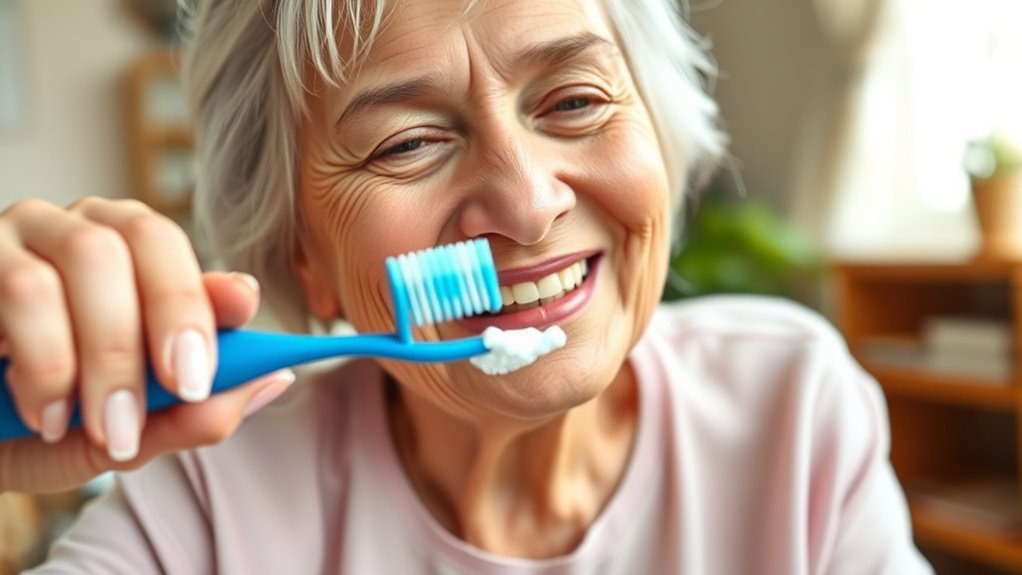To maintain good dental health as an older adult, brush twice daily with fluoride toothpaste using a soft-bristled brush, and floss daily or use water flossers to remove plaque. Stay hydrated to combat dry mouth, and visit your dentist regularly for checkups and preventive care. Choose gentle, ADA-approved products suited to your needs, and adapt your oral routine if you have limited mobility. Keep exploring for more tips to protect your smile and overall health.
Key Takeaways
- Brush twice daily with fluoride toothpaste and replace your toothbrush every 3-4 months.
- Floss daily or use water flossers to clean between teeth and prevent gum disease.
- Visit your dentist regularly for checkups, cleanings, and early detection of oral health issues.
- Manage dry mouth by staying hydrated, chewing sugar-free gum, and using fluoride rinses.
- Use soft-bristled or electric toothbrushes and consider specialized tools suited for limited mobility.
Maintaining Effective Daily Oral Hygiene Routines

Maintaining effective daily oral hygiene routines is essential for older adults to keep their mouths healthy. Good dental hygiene involves brushing twice daily with fluoride toothpaste and a soft-bristled toothbrush for at least two minutes. This helps remove plaque and reduces the risk of cavities and gum disease. Incorporating motivational inspirational quotes about fatherhood can remind caregivers and patients alike of the importance of consistent self-care routines. Flossing daily or using alternative tools like water flossers effectively clears food debris and plaque between teeth, preventing periodontal issues. If you have a dry mouth, rinsing with water before brushing and using fluoride mouthwash afterward can strengthen enamel and protect against decay. Remember to replace your toothbrush every 3-4 months or when bristles fray to ensure thorough cleaning. Regular checkups with your dentist support oral health maintenance and early detection of potential problems. Practicing proper dental hygiene techniques can significantly decrease the likelihood of age-related problems like root decay and gum inflammation. Additionally, being mindful of salivary flow can help reduce dry mouth symptoms and improve overall comfort.
Choosing the Right Dental Products and Tools
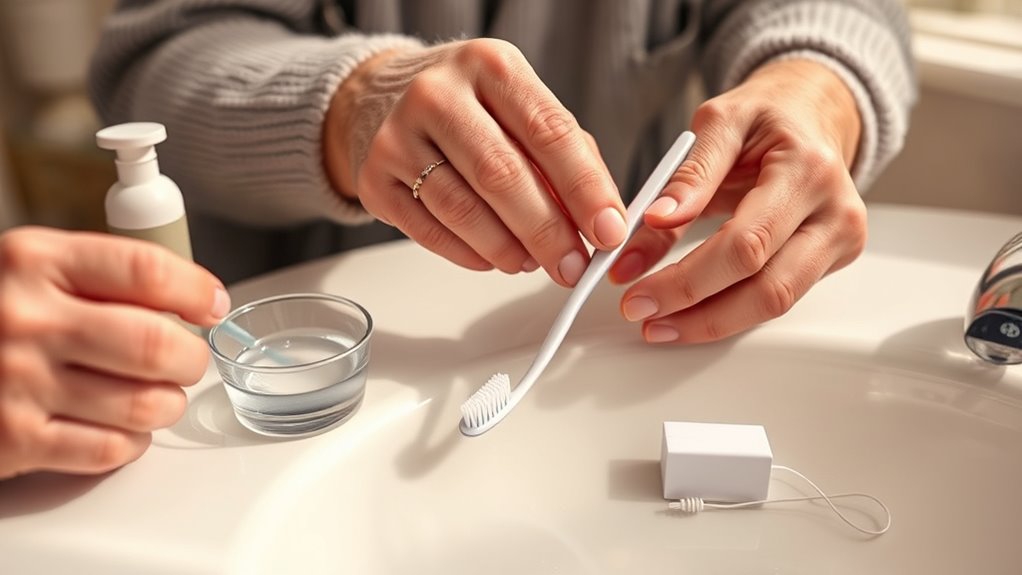
Choosing the right dental products can make a big difference in your oral health. Opt for ADA-approved fluoride toothpaste and soft or extra-soft toothbrushes to protect sensitive gums and teeth. Consider electric toothbrushes and alternative flossing tools to make cleaning easier and more effective. Incorporating proper oral hygiene routines can further preserve your dental health and prevent issues. Using diverse and specialized tools like waterless and self-watering planters as analogy, selecting the appropriate dental tools tailored to your needs can enhance your daily dental care routine and ensure long-term oral health. Additionally, exploring specialized dental products designed for older adults can address age-related oral health challenges more effectively. Embracing a positive mindset about dental health can also motivate consistent care and reinforce healthy habits over time.
Selecting Suitable Toothbrushes
Selecting the right toothbrush is essential for effective oral care, especially for older adults. Choose a soft or extra-soft toothbrush to prevent gum irritation and protect sensitive or receding gums. An electric toothbrush can enhance plaque removal and ease cleaning if dexterity is limited. Opt for a small toothbrush head to reach all areas comfortably, especially hard-to-access spots. Use a toothbrush with an ergonomic, non-slip handle or grip aids for better control. Remember to replace your toothbrush every 3-4 months or sooner if bristles fray to maintain ideal cleaning. Proper brushing technique and appropriate dental products can further improve oral health outcomes. Consider the table below to compare options:
| Feature | Benefits | Recommendations |
|---|---|---|
| Soft toothbrush | Gentle on gums, effective | Ideal for sensitive gums |
| Electric toothbrush | Better plaque removal | Suitable for limited dexterity |
| Toothbrush handle | Improves grip | Non-slip, ergonomic handles |
| Toothbrush head size | Reaches hard spots | Small head for better access |
| Toothbrush replacement | Maintains cleaning efficiency | Every 3-4 months or when frayed |
Using the right toothbrush can also help prevent gum recession, which is common among older adults and can lead to further dental issues. Additionally, selecting dental products that are suitable for aging mouths can enhance overall oral health and prevent other problems related to aging. Regularly consulting with your dentist about your oral care routine can further improve your dental health and address specific concerns.
Using Effective Oral Care Products
Using the right oral care products can substantially improve your daily dental hygiene routine. Choose ADA-approved fluoride toothpaste to strengthen enamel and reduce cavities, especially if you have dry mouth.
Opt for a soft or extra-soft toothbrush to prevent gum recession and irritation, replacing it every 3-4 months. Consider an electric toothbrush for more effective plaque removal, especially if mobility is limited.
Incorporate mouth rinses with fluoride or antimicrobial agents to boost protection against decay and gum disease. Use dental tools like floss picks, water flossers, or interdental cleaners to make daily cleaning easier and more thorough.
Prioritizing these products guarantees better oral hygiene and helps maintain a healthy smile as you age.
Managing Dry Mouth and Tooth Sensitivity
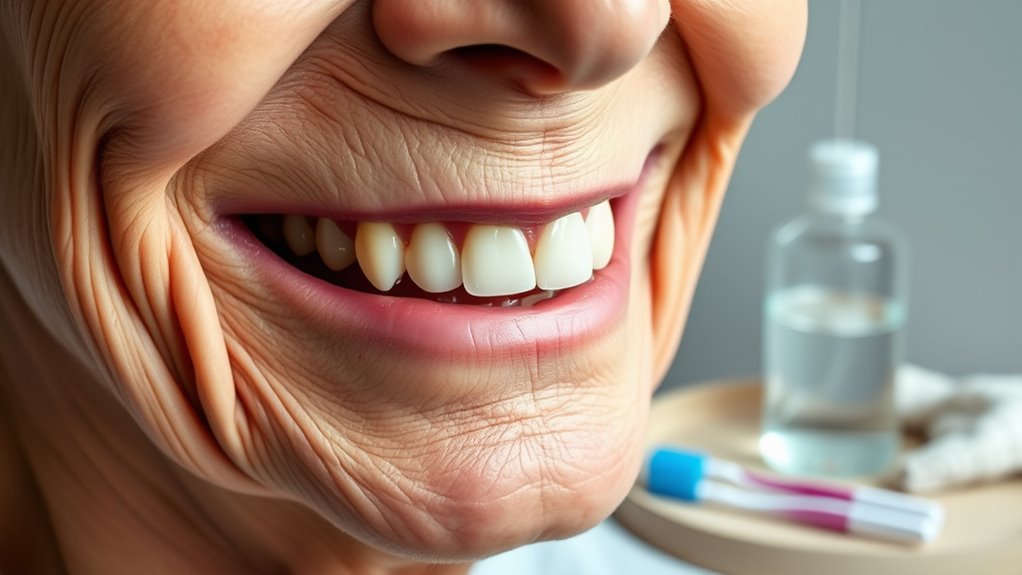
Managing dry mouth and tooth sensitivity is essential for maintaining oral comfort and health as you age. Dry mouth can affect up to 40% of elderly adults, increasing cavity risk. To combat this, stay well-hydrated and avoid acidic foods. Chewing sugar-free gum or lozenges with xylitol can stimulate saliva production, helping your oral health. For tooth sensitivity, use desensitizing toothpaste containing potassium nitrate or strontium chloride to reduce nerve discomfort. Regular dental care is crucial for tailored solutions. Here’s a quick overview:
| Issue | Solution |
|---|---|
| Dry mouth | Hydration, saliva-stimulating products, avoiding alcohol |
| Tooth sensitivity | Desensitizing toothpaste, avoiding hot/cold foods |
| Overall care | Regular dental visits, proper oral hygiene |
Research indicates that vetted electric bike kits are reliable and easy to install, which can help seniors maintain active lifestyles that support overall health.
Planning Regular Dental Check-Ups and Professional Care

Scheduling regular dental check-ups every six months helps catch problems early and keeps your mouth healthy. Be sure to communicate any changes in your dental health or symptoms to your dentist during visits. This way, you can get personalized care that addresses your specific needs and maintains your smile. Regular visits are especially important for older adults, as they can help monitor for issues related to oral health maintenance and ensure any emerging concerns are addressed promptly. Using appropriate dental tools like specialized toothbrushes can also support ongoing oral health. Incorporating dental health tips such as proper brushing and flossing techniques can further enhance your oral hygiene routine. Understanding dream symbols related to health can sometimes provide additional insights into your well-being.
Scheduling Routine Appointments
Have you set a reminder to visit your dentist every six months? Scheduling regular appointments is key to maintaining your oral health.
During these visits, your dentist can perform dental check-ups, professional cleanings, and monitor age-related issues like dry mouth and gum recession. Regular appointments help catch problems early, reducing the need for extensive treatments later. They also allow for preventive treatments such as fluoride applications and sealants, strengthening your teeth. Creating a consistent dental care routine that includes these visits can help prevent more serious issues from developing over time. Additionally, staying informed about dental health statistics can motivate you to prioritize regular check-ups. Incorporating preventive care into your routine not only benefits your teeth but also supports your overall health by preventing infections that could affect conditions like heart disease or diabetes. Staying aware of cybersecurity threats related to digital health records ensures your personal information remains protected during these appointments. Regular dental visits are a vital part of healthy aging, helping maintain your smile and confidence well into later years.
Communicating Dental Changes
Regularly communicating with your dentist about any changes in your oral health is essential for maintaining your smile as you age. By sharing symptoms like sensitivity, dry mouth, or trouble chewing, you enable your dentist to provide personalized care tailored to your age-related needs. Discussing medications and health conditions helps prevent complications like gum issues or dry mouth. Staying proactive with these conversations ensures timely interventions and better outcomes. Incorporating vetted dental products can further support your oral health and comfort during dental visits. Understanding market regulations related to dental care can also help you make informed decisions about treatments and products. Being aware of entertainment support hours such as those at dental health programs or clinics can help you plan your visits more effectively. Additionally, maintaining open communication about somatic therapy techniques that could complement your dental health routines may enhance overall well-being.
Adapting Oral Care for Limited Mobility and Special Needs
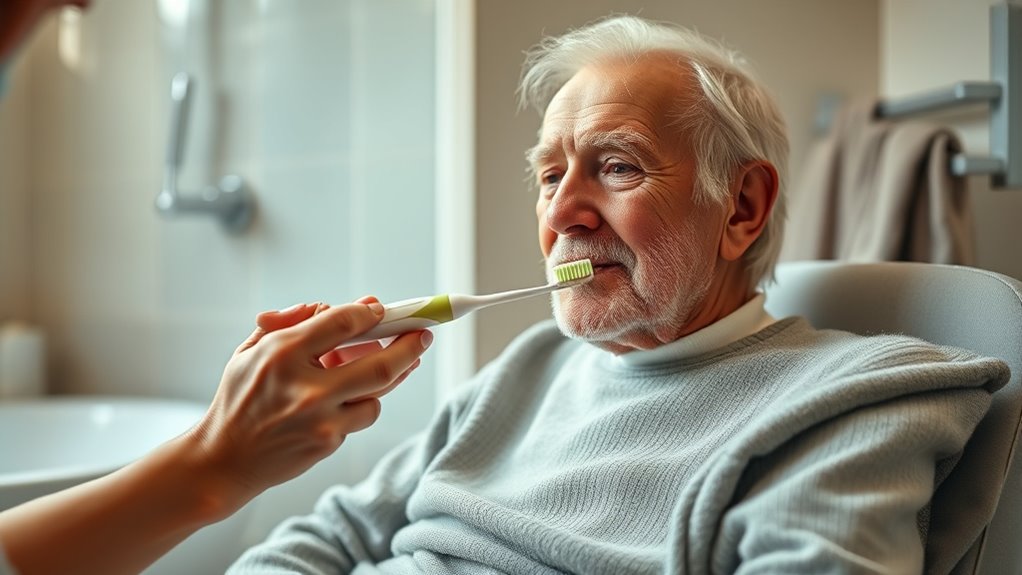
Adapting oral care routines is essential for older adults with limited mobility or special needs, ensuring they can maintain good dental health safely and effectively. You can improve elderly dental hygiene with tools like electric toothbrushes, which enhance grip and ease brushing.
Using interdental cleaners such as floss picks or water flossers simplifies plaque removal for those with dexterity challenges. Safety modifications, like adjusting bathroom lighting and reducing glare, help prevent accidents.
Caregiver assistance and demonstrating proper techniques through large-print instructions boost understanding and compliance. To support your oral health routine, consider:
- Using modified toothbrush handles
- Employing electric toothbrushes
- Incorporating interdental cleaners
- Making safety modifications in the bathroom
- Seeking caregiver help when needed
These steps promote effective adaptive oral care, even with limited mobility or sensory impairments.
Supporting Overall Health Through Good Oral Practices
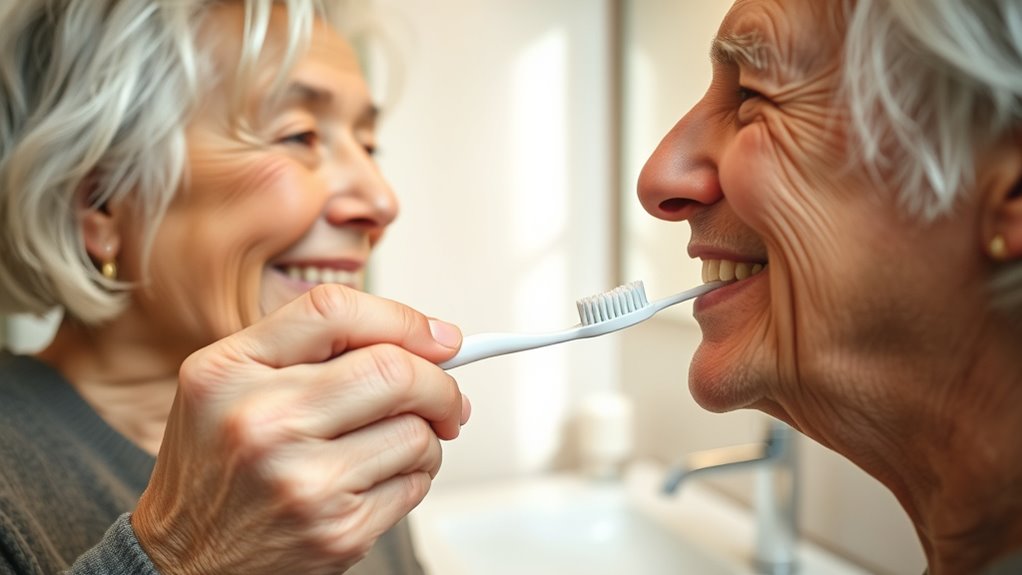
Maintaining good oral habits not only keeps your mouth healthy but also supports your overall well-being. Proper dental hygiene, like brushing twice daily with fluoride toothpaste and flossing regularly, reduces the risk of gum disease and tooth decay, which are linked to systemic health problems such as heart disease and diabetes.
Regular dental care every six months helps catch infections early, preventing bacteria from entering your bloodstream. Managing dry mouth by staying hydrated and using sugar-free gum or lozenges boosts saliva production, lowering cavity and throat infection risks that can affect respiratory health.
Addressing dental issues like sensitivity promptly supports better nutrition and digestion. Consistent oral practices, including preventive treatments, contribute remarkably to your overall health and quality of life.
Frequently Asked Questions
How to Keep Teeth Healthy in Old Age?
You can keep your teeth healthy in old age by brushing twice a day with fluoride toothpaste and a soft brush, which helps prevent cavities and gum disease.
Floss daily or use interdental tools to reduce plaque.
Visit your dentist every six months for checkups, stay hydrated, chew sugar-free gum to stimulate saliva, and eat a diet rich in calcium and vitamin D to strengthen your teeth and bones.
What Oral Hygiene Is Recommended in the Elderly?
Did you know that nearly 25% of adults over 65 have untreated cavities? To keep your mouth healthy, brush twice daily with fluoride toothpaste using a soft-bristled brush, and floss once a day to remove plaque between teeth.
Visit your dentist every six months, and consider electric toothbrushes or adaptive tools if you have limited dexterity.
Rinsing with water and fluoride mouthwash also helps protect your enamel and prevent decay.
How Often Should a 70 Year Old Go to the Dentist?
You should visit the dentist at least twice a year. Regular check-ups help catch issues like gum disease, dry mouth, and tooth decay early, which are common at age 70.
If you have specific problems or health conditions, your dentist might recommend more frequent visits. Staying consistent with dental appointments not only keeps your smile healthy but also supports your overall well-being and quality of life.
How to Fix Years of Bad Dental Hygiene?
If you’ve neglected your dental health for years, start by visiting your dentist for a thorough exam and cleaning.
For example, a patient with decades of plaque buildup received professional deep cleaning and restorative treatments like crowns.
Then, adopt a strict at-home routine—brush twice daily, floss, and use mouthwash.
Quitting tobacco and cutting back on sugar also help.
Consistent care can repair damage and improve your smile over time.
Conclusion
Taking good care of your teeth isn’t just about a daily routine—it’s about enjoying life’s little moments, like sharing a laugh or savoring your favorite meal. When you stay consistent with your oral health, you might find yourself surprised at how much brighter your smile becomes and how much better you feel. After all, a healthy mouth can lead to a happier, more confident you, making every day a little more enjoyable.
